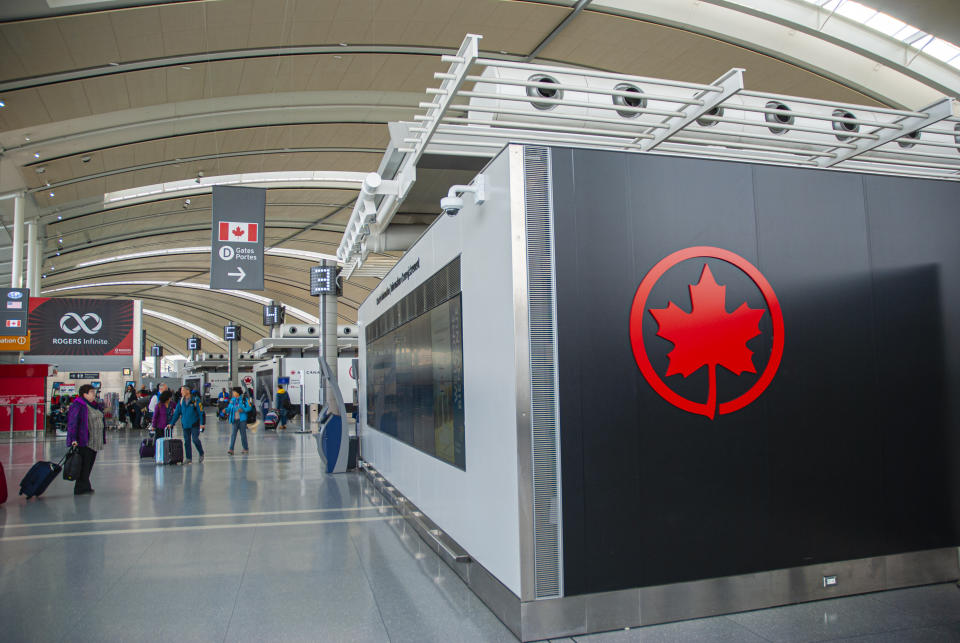Air Canada says coronavirus, 737 Max grounding will drag earnings down

Air Canada says the grounding of the Boeing 737 Max aircraft and the impact of the recent coronavirus outbreak will drag down its earnings in the first quarter of 2020.
Canada’s largest airline said Tuesday that it now expects its first quarter earnings before interest, taxes, depreciation, amortization and impairment (EBITDA) to be $200 million less than during the same time last year as it continues to grapple with increased costs associated with the grounding of the Boeing 737 Max jet.
Those costs have been exacerbated by additional challenges, including the impact of the coronavirus, which has seen Air Canada suspend its service to mainland China, as well as higher employee benefit costs.
“We start 2020 with uncertainty from the on-going Boeing 737 Max grounding and the constraints it imposes, as well as emerging economic and geopolitical risks and route suspensions resulting from the COVID-19 virus,” Air Canada’s chief executive Calin Rovinescu said in a statement.
The Boeing grounding will still be the most significant contributor to the earnings drop, Air Canada’s chief financial officer Michael Rousseau said on a conference call with analysts on Tuesday. Last year, the airline was operating 24 of the Boeing 737 Max aircrafts.
“It is one of our most efficient aircrafts, being backfilled by less efficient aircraft, which is certainly not helping,” Rousseau said.
The airline said certain routes have seen a significant decrease in profitability because it has had to cut capacity due to the 737 grounding and deploy less efficient jets instead. For example, before the grounding, Air Canada was flying six daily flights from locations in western Canada to Hawaii. Those routes have been since cut in half, Air Canada’s chief commercial officer Lucie Guillemette said, impacting the company’s overall performance.
Air Canada said it’s also covering the cost of retaining the approximately 400 pilots who were hired to fly the 737 Max planes and are waiting for the jet to return to service.
Still, the airline said it hopes to recover the first quarter shortfall over the year. Air Canada said it will see capacity growth in the first quarter as the airline redeploys planes from Pacific routes – specifically to China and Hong Kong – to Atlantic routes due to the impact of the coronavirus as well as ongoing geopolitical tensions between Canada and China.
Despite the challenges with the Max, Air Canada reported an adjusted net income of $917 million, or $3.37 per diluted share in 2019, up from $738 million, or $2.67 per diluted share last year. Operating income came in at $1.65 billion in 2019, an increase from $1.5 billion in 2018.
Rovinescu said Tuesday that Air Canada’s strong performance despite the 737 Max grounding – which he called a “black swan event unseen previously in our industry” – as well as the impact of the coronavirus, shows how far the company has come over the last decade.
“The magnitude of which only became apparent in early February of this year would have been an existential threat a decade ago,” Rovinescu said told analysts.
“There is no question that we are now not only stronger than we were 10 years ago, but that we are truly transformed.”
Exactly when the Boeing 737 Max will return to service remains to be seen. The company released a statement on Jan. 21 saying it expected that the “ungrounding” of the aircraft would begin in mid-2020.
“We’re quite confident that the Boeing 737 Max will fly again and we believe customers will regain confidence in this aircraft,” Rovinescu said.
“Once the aircraft is ruled safe by the regulators, by Boeing and by all of our own internal safety and pilot groups, we will be fully dedicated to returning it safely to service.”
Download the Yahoo Finance app, available for Apple and Android and sign up for the Yahoo Finance Canada Weekly Brief.

 Yahoo Finance
Yahoo Finance 
